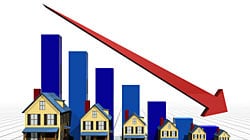
This week's latest real estate data show—surprise!—housing prices continue to fall across the US. There are various unpleasant side effects of declining house prices, at least one of which doesn't get the attention it deserves. Granted, none of the things that happen in falling housing markets are pleasant—unless you're looking to buy a house, and even that is tough given the relative difficulty of obtaining a mortgage—but simply being unwanted doesn't make them go away.
First, a declining house price makes you poorer. That's no fun, especially because being poorer—a negative wealth effect, in deliriously opaque econo-jargon—will generally lead to you spending less, and Americans are nothing if not indefatigable spenders. (Whether that is a good idea, or whether it should even be a goal in the future, are different questions.)
Should we care? Absolutely. By way of context, about 12 percent of US homeowners move in a typical two-year period.
Second, a declining house price can lead to you owing more on your house than it is worth. The term of art for that situation is being "upside-down" on the mortgage, which makes it sound more like a tai chi position than the sad state of financial affairs it is. Generally speaking, people who owe more on their mortgage than the house (or apartment or condo) is worth don't stay that way for long. They walk away from it. After all, why keep making payments on a property that has to gain in value just to get you back to the point where you'd make no money from unloading it?
The third thing that can happen is rarely mentioned. The mobile American labor market breaks down when housing prices fall. Why? Because people will likely move less frequently, if at all. Tearing yourself away from a house when you know you are going to lose money on the sale (assuming you can sell it) is no easier than selling a stock when it is down, and there are plenty of reasons to think it's harder. What does the evidence show? According to some new research, using data from 1985-2005, money-losing homeowners were 50 percent less likely to move than was otherwise the case.
Should we care? Absolutely. By way of context, about 12 percent of US homeowners move in a typical two-year period, making Americans among the most mobile citizens of any developed economy in the world. People move for a host of reasons, but most common among them are economically driven factors, like a new or better job. Economists generally approve of that sort of thing, as it often leads to higher wages through better matches in the job market—you obtain a job more closely fitting your skills and experience, so you are paid more.
Less mobility means worse matches in the labor market—the best person for the job isn't always hired; people earn less overall—and that represents a kind of tax in the economy.
The amount of the tax is open to question, but it has plausibly been argued that cutting mobility rates in half across the US economy would slice 0.4 percent or so off domestic GDP. While not huge, it is still a sizable number, and another blow to an already reeling US economy.
It doesn't stop there, of course. People locked into their houses probably aren’t any happier or wealthier. They're less likely to spend money on renovations on houses they plan to eventually leave. They may also be less integrated into their community, as they wait in a sort of real estate-induced limbo, neither planning to be locals for a long time nor knowing where they will go if and when real estate markets improve and they can exit their home-cum-prison.
Should we do anything about it? Does it make it any more important to think about modifying US mortgages? Well, for the sake of argument, if poorer labor market matches could lead to as much as a 0.4 percent reduction in GDP, that is about $520 billion, more than has been spent on the TARP bailout plan to date. And that cost comes alongside the many other consequences of a busted real estate business, which we are painfully experiencing today, from foundering banks to messed-up equity markets. These are, in other words, big numbers. So while we have been focused on the cost of having people thrown out of their houses, maybe we need to spend at least a little time worrying about the cost of having them stuck there.
Paul Kedrosky is the editor of Infectious Greed, one of the best known business blogs. He's currently a senior fellow at the Kauffman Foundation, where he is focused on entrepreneurship, innovation, and the future of risk capital. He is also a strategist with Ten Asset Management, a Southern California institutional money management firm.





